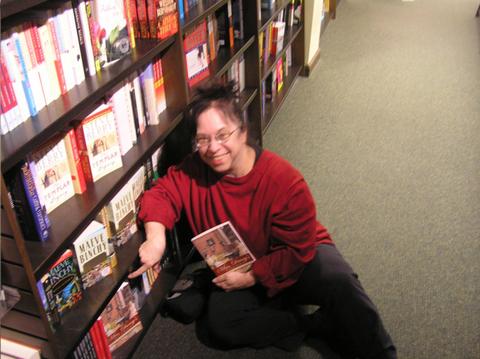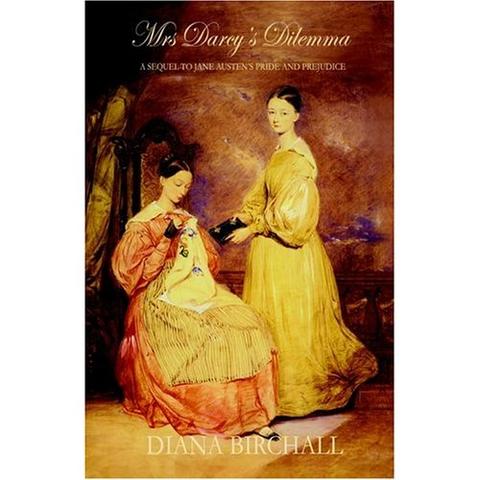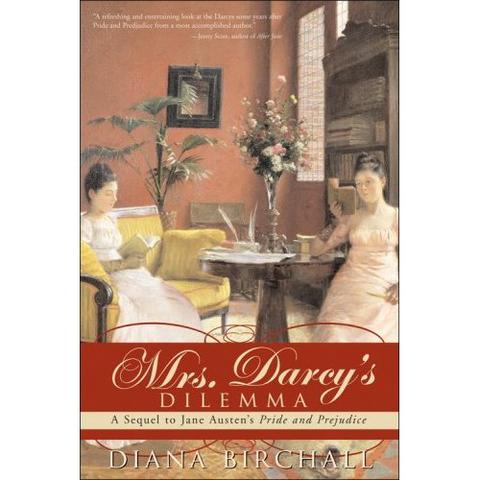Ellen and Jim Have a Blog, Too
We are two part-time academics. Ellen teaches in the English department and Jim in the IT program at George Mason University.


_Mrs Darcy's Dilemma_ & _The Duties of the Spirit_ · 1 March 08
Dear Anne,
I write tonight to tell of two more books I’ve read straight through, enjoyed & recomend: Diana Birchall’s Austen novella, Mrs Darcy’s Dilemma, & Patricia Fargnoli’s slender book of poems, The Duties of the Spirit. They are linked: both center in the presence of a woman grown older, & are inspiriting & filled with good feeling.

A photo of Diana (taken by her son, Paul) at Barnes & Noble
Birchall’s Mrs Darcy’s Dilemma consists of a story which presents the characters from Austen’s Pride and Prejudice a quarter of a century later in perspective & with details that often recall characters and incidents in Mansfield Park & more occasionally Northanger Abbey, Emma & Sense & Sensibility, and some of what is thought by some to be true about Austen’s family members. The story is initiated when the now nearly 50 year old Elizabeth Darcy invites her sister, Lydia Wickham’s two daughters, Bettina and Cloe Wickham, to stay with her own 17 year old daughter, Jane Darcy. The resulting incidents enable Birchall to comment on the fates of Austen’s characters from her own mid- to later 20th century perspective.
First the parallels with MP: while Lydia’s character resembles that of Mrs Bennet in P&P (as do quite often her words), Lydia’s situation recalls that of Frances Price in MP: Lydia’s husband, Wickham is aging, often drunken, bankrupt and (to those who are connected to him who have any pretensions to taste or usefulness) socially embarrassing; he & Lydia have had 8 or 9 children they cannot afford to educate or place. Elizabeth & her husband, Fitzwilliam Darcy’s eldest son, Fitzwilliam, a none-too-bright, gambling, sporting, selfish & amoral young man, heavy & dull, who nearly dies in the book (recalling all at once Tom Bertram, James Rushworth, & what Austen’s biographers have said of Harris Bigg-Wither) falls in love with the apparently shallow, cold, & ambitious Bettina. Sometimes Bettina resembles Austen’s Lydia (“vulgar, presuming and untamed”, p 78), sometimes the desperate Lucy Steele (Austen’s S&S), and Birchall’s Fitzwilliam and Bettina elope much in the manner of Lydia & Wickham in Austen’s P&P. However, they do not marry, and when Fitzwilliam tires of Bettina, the point is made explicitly that Bettina does not end up living a miserably isolated punitive life in the country in the way of Maria Bertram with Mrs Kitty Clarke (Austen’s Kitty, whose character resembles Mrs Norris’s, now all grown up, married to a clergyman, Dr Clarke, given a living by the Darcys), but rather flourishes as an actress who moves from protector to protector & enjoys a pleasurable if precarious upper class social life in early Victorian London. The first cover of the book was a painting of Florence Nightingale and her sister Parthenope, painted when they were ages 16 and 17 in the appropriate year 1837:

Darcy’s second 2nd son, Henry, good-natured, ethical, witty, has some of the traits of Henry Tilney & Austen’s own brother, Henry Austen, but his fate, values, and a climactic dialogue are modelled on Edmund Bertram & MP: Henry has a dialogue with Bettina late in the book which contrasts to Austen’s Edmund’s dialogue with Mary Crawford, because while Bettina’s amoral stance alienates Henry, it is justified by what has happened in the book. Henry helps nurse Fitzwilliam back to life after Fitzwilliam has a bad accident riding a horse from which (unlike Austen’s Tom Bertram) Fitzwilliam ends up crippled from the waist down.
Austen’s Emma underlies Mrs Darcy’s Dilemma too. Lydia’s second daughter, Cloe, story is partly modelled on Austen’s Jane Fairfax in Emma: like Austen’s Jane Fairfax, Birchall’s Cloe falls deeply in love with a gentleman above her in income, Elizabeth & Fitzwilliam Darcy’s second son, Henry Darcy, and he loves her. Like Jane Fairfax, and Birchall’s Jane Darcy, Cloe is a gentle, intelligent, kindly, sensitive, and altogether exemplary traditional heroine But unlike Austen’s heroine, Cloe refuses to get engaged to her hero, and goes out to work as a governess, in the second instance for Mr Collins and Charlotte who have a passel of children. Cloe is exploited badly and cannot live an at all fulfilled life under the thumb of Charlotte’s needs and demands. In a key scene in the book, placed similarly at the end of the book & climactically to Austen’s Elizabeth Bennet’s confrontation with Lady Catherine de Bourgh, Birchall’s Cloe is bullied & insulted cruelly by Birchall’s Lady Catherine, with the perhaps more realistic difference that Cloe caves in, & agrees she should leave her position with the Collinses as her family has made her a disgrace to all she comes in contact with. Cloe is only saved by Henry’s forceful insistence that she admits she loves and marry him. Lady Catherine’s tone and words often recall those of Mrs Elton bullying Jane Fairfax (“I am quite a proverb for fairness,” p. 180).
Again Austen’s NA seems to have been in Birchall’s mind: there are poignant memories of the character of Eleanor Tilney in Cloe and other young women characters in the book who do not have kind mothers to be their friends, even the explicit inference in the book about all the motherless or badly mothered girls is (in Birchall’s Elizabeth Darcy’s words) “a childlike mother is a terrible burden for a daughter” (p. 95). Here we may remember Austen’s Fanny Price.
Mrs Darcy’s Dilemma is probably called “a sequel to Pride & Prejudice” because part of the interest of the narrative (what keeps the reader reading on) is to discover the later fates of the characters of Austen’s Pride & Prejudice. I was delighted to discover that Mary Bennet is presented in a sympathetic light as a reading older woman, now a widow, living with her somewhat embittered and asocial widowed father, Mr Bennet. Mary or Mrs Smith, the poor widow of an attorney’s clerk, is still sententious, but what she says and does (including a desire to tidy up Darcy’s large library) is presented with affectionate fondness & understanding. Jane and Charles Bingley live not far from the Darcys and have had a happy life together, but they have a ne’er-do-well extravagant & unloving son, Jeremy: one of the themes of the book is that having children is (to use Austen’s Mary Crawford’s language) a “take-in:” no matter what system you use, or who you are, you cannot know how your children will turn out.” Mr & Mrs Hurst died of (respectively) dropsy & apoplexy. Miss Bingley has married a reincarnation of Mr Hurst, a Mr Babcock, & lives an envious & resentful existence with (or off) the Bingleys. Georgiana Darcy married, a Lord Neville whose character reminds me of Eleanor Tilney’s ideal mate at the close of NA. Anne de Bourgh died young “the victim of excessively copious doses of calomel, prescribed by” Lady Catherine, her mother. Well, Anne was put out of her misery.
For the lover of Austen, some of the pleasures of the text also consist in Birchall’s frequent imitation of Austen’s style, turns of phrase, & cool jokes. I liked how Birchall brought Elizabeth, Jane, Kitty & Mary (the Bennet girls that were) back together at Pemberley by the end of the book. Even better was when Birchall’s story took off in its own right, for example, in Chapter 10, when Fitzwilliam and Elizabeth Darcy agree they will not take their daughter, Jane, to London for a coming-out season. Here is one of the places in the novel where its kindly feeling and pragmatic ethics come together.
[Darcy]: ”’I have always made but a poor figure in a drawing-room myself. However, many things may go on in London, without us. The great hostesses will be forced to find other people to invite them; the poor old King may sicken and pehaps die, and we will miss the spectacle of a new young Queen; and then Jane in her eighteenth year will not come out as she ought. But it will not matter to the world, or, what is more to the purpose, to me. I shall be perfectly happy in the country. There ae improvements to the house that can very well be done in this quiet season, and ther is anotner consideration. You may perhaps not like to leave Henry alone in Derbyshire in his first winter’s curacy. But it is for you to decide.’
[Elizabeth:] ‘Oh … you are no help at all, leaving it to me, as the excellent husband I have taught you to be. A good wife, you know, makes a good husband. But I am torn a thousand ways. I confess that even with all the delights of London to which you so feelingly allude, I could take no pleasure in them while we are where reports of Fitzwilliam’s behaviour will reach us daily, and there are innumerable friends to be very sure that they do and to cunningly savour our reaction’.” (p. 112)
Amid the imitation of Austen’s caustic satiric tones, I hear the accents of Birchall’s personal life coming out here. The novel becomes an original authentic take-off in the way of many of the better Austen movies.
I confess to some disappointments. Birchall does not develop any dramatized scenes of friendship between her women. We are told Elizabeth and Jane are still close, but we do not experience it. Charlotte Lucas Collins is an absence on the page (simply named), a willing instrument of her narrow husband. Elizabeth expresses kindly sentiments towards & defends her daughter, nieces, & sisters, but all the scenes between women that we have dramatize antagonism, petty vexation, & mindless vanity vying with passive retreat which does not usually defend itself (as in the scenes between Bettina and Cloe). But the women aren’t the villains of the piece as all ends in relative contentment; Elizabeth argues women are peculiarly vulnerable and treated unfairly, Darcy & Elizabeth blame their older son & then their nephew for abandoning Bettina (pp. 122-25, 144-45).
The book is oddly old-fashioned, self-conciously literary: there is a curious rewrite of Austen’s sometimes harsh attitude towards drones: Elizabeth and Darcy are said to be ready to accept Fitzwilliam’s death on grounds similar to Austen’s infamous dismissal of Dick Musgrove in Persuasion (see Ch 10, pp. 131-32). Its morality does not take into account larger economic or political realities. On the other hand, as a reader who likes older fiction, I much enjoyed the uses of inserted letters (very 18th century), descriptions of rich dresses, recreations of idyllic settings (see “a flowering apple-tree in Mr Darcy’s garden”), and the typically Austenian quiet coda endings in numbers of the chapters.
My two favorite jokes in the book:
“Mrs Clarke [Kitty Bennet that was] and Mrs Wickham were working [sewing] while Mrs Darcy read to them from the latest number of Pickwick, of which it is doubtful they heard much, though her spirited style did full justice to it.
[Elizabeth:] ‘There you are, my dear [to Jane Darcy], I have started Pickwick but do not believe I am much beyond the place where we left off last time. Shall I go back a little? Your aunts will not mind.’
‘Oh dear no. I could listen to dear Walter Scott forever,’ said Lydia with a great gape, laying down her stitchery’” (p. 114)
And
[Elizabeth to Mary]: ‘You must have a good rest after your labour … no new duties; just enough for happiness—that is, if you want solid activity, there are Mr Darcy’s books that have not been arranged for a long time. Books are all over the house, I confess; he is always ordering more, and no one ever puts them back in the right places. We need a grand re-arrangment.
‘I would not have believed it possible,’ said Mary, shocked. ‘Any disorder in books is what always should be prevented’” (p. 163).
The new cover to the book captures its distance from contemporary fiction:

I’ve linked this Austen sequel to a book of poems I’ve just been reading because Duties of the Spirit is also written by an older woman who offers as wisdom an acceptance of what is.
The Village
by Patricia Fargnoli
A little after noon. The village carillon
plays something in a minor key.
Bell notes bounce against the winter skyy
solid blue after days washed with gray.
A woodpecker raps against the highest trunk,
and what melted in yesterday’s rain
has frozen into sheets of ice.
Walking’s treacherous.
February smells of iron.
Main Street’s visible through the trees.
At the post office cars shuttle
townsfolk in and out
mail-gatherers at the boxes.
The country’s on high alert again.
Here is the life I know:
crow each morning on the same
furred branch,
Walpole Historical Society Museum,
white and churchlike on the hill,
a town so picture-perfect
it’s been laid out
in a coffee table book.
Above me, in the giant maple,
one branch lies winter-snapped
and ready to fall but for the way
it’s cradled across two other limbs.
One good wind would bring it down.

There is a wonderful review of Fargnoli’s book online and also more poems.
Sophie
--
Posted by: Ellen
* * *
Comment
- From Kathy C:
“Dear Ellen,
It is so difficut to write Jane Austen-inspired novels, though there are so many (a mystery series, etc.): I couldn’t even read Karen Joy Fowler’s The Jane Austen Club (which is similar to many novels about women’s groups: The Memoir Club, The Knitting Club, etc.). Fowler must have made her fortune off The Jane Austen Book Club. Every book club in the country read it it. Certainly all the book groups here in the midwest. And Fowler IS a good writer, though the club seemed more important than the Austen.
But Diana’s books sound more interesting . Much more difficult, more work to write a seqel. And I have a copy of Mrs. Elton in America, which looks very witty. I enjoyed your review: very fair, I thought, and exactly the kind of review I like. Positive, trying to find out the writer’s intention, yet not overpraising.”
— Elinor Mar 3, 5:36pm # - Diana thanked me and talked about her book as follows:
“Thank you so much, Ellen, for being so kind as to give my book a really thoughful analytical review. Is it done to thank friends who write reviews, on the same review space? With blogging, the world of book reviews is growing increasingly blurred. But I really am grateful for the compliment of your considering my book worth such analysis. It’s been a mighty long road since I wrote Mrs. Darcy’s Dilemma way back in 1994, long before the Proliferation.
Most of the blogosphere reviews agree it doesn’t resemble other sequels much, as my interest was mostly in the language; yet I don’t despise sequels. My feeling can be expressed by bowdlerizing Jane Austen’s famous quote, “Only a novel!”
“Yes, novels; for I will not adopt that ungenerous and impolitic custom so common with novel-writers, of degrading by their contemptuous censure the very performances, to the number of which they are themselves adding.”
Diana Birchall”
— Elinor Mar 4, 6:28am # - Ellen, I really appreciate the time and effort you have put into this book review. It was clear that you enjoyed this sequel and it has inspired me to put this book on my TBR pile, whereas The Jane Austen Book Club did not. A sequel by another author especially of another era way removed from Jane’s times seems an exercise in ego stroking, but your review tempts us to see for ourselves!
Cheers,
Michele (aka Chel) Scone Australia
— CheleBelle Mar 15, 6:46am # - Dear Michele,
Thank you for your comment. I was concerned to bring out how Diana’s book is strongly indebted to Mansfield Park and also combines elements of Emma and NA. It really is a gratifying book for an Austen lover.
Part of its Austen charm is it’s not an update in the way of The Jane Austen Club. Diana does vindicate her Maria Bertram character, and give her an ending which recalls that of Becky Sharpe (she’s alive in the world, not dead with Mrs Norris as companion), but in general she sticks to an old-fashioned set of values about prudence, following reason & common sense, a hard work ethic, monogamous marriage and eschews outside politics (except for an incipient proto-feminism). That keeps it in the Austen terrain: for Austen was not a romancer whatever people in the popular media may like to proclaim. Diana can use Austen’s language so readily because she has stayed with these values (some of which are today not thought acceptable and thus swept away in just about all the movies since the mid-1990s).
The Jane Austen Book Club, Bridget Jones’s Diary and other free adaptations (I’ll call them) either swerve away strongly from the set of values you find in Austen and her temperament or attempt to re-articulate them in modern terms. I enjoyed these books equally.
E.M.
— Elinor Mar 15, 8:16am #
commenting closed for this article
